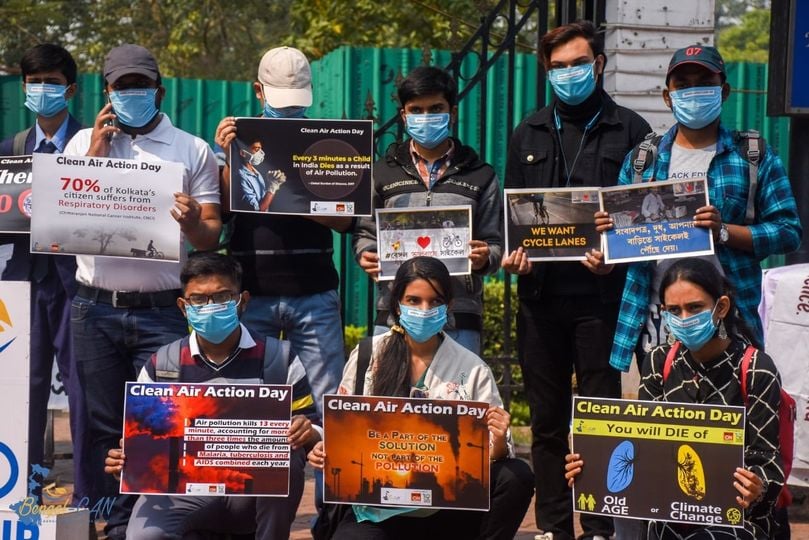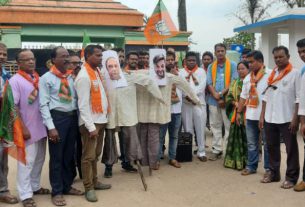Bhubaneshwar, September 7: In a first of its kind campaign, concerned citizens across Odisha have joined hands to demand that the Urban Local Bodies (ULB) mandatorily issue timely health advisories publicly, to alert citizens on ‘bad air’ days, which will help save vulnerable groups from severe health impacts of air pollution.
Bad air days are when the air quality index (AQI) – pollutant measuring indicator – rises beyond the safe limit for any location falling either under the poor, very poor or hazardous AQI levels.
University of Chicago’s Air Quality Life Index suggests that residents in Cuttack and Bhubaneswar could live 2.7 years longer if the government meets the WHO air quality standards. According to a report of the Odisha State Pollution Control Board, Bhubaneswar is recording an alarming level of suspended particulate matter (SPM) in air. Six cities of Odisha are among the 102 most polluted in India. A non-attainment city is one that does not meet the prescribed air quality standards set by the Union Environment Ministry.
It’s time that we realize that air pollution is cutting our lives short. It’s time that the health impacts of air pollution become a subject of discussion at our homes, schools, and offices. It’s time to create conversations that can drive create lasting change,” Ashirbad S. Raha, EPIC India, University of Chicago.
An online campaign has been initiated on September 7- the International Day of Clean Air for Blue Skies. The theme for 2021 is ‘Healthy Air, Healthy Planet’, which emphasizes the health aspects of air pollution, especially considering the Covid-19 pandemic.
Vinay Jaju, Founder of SwitchOn Foundation and member of West Bengal Clean Air Collective said, “Using the online petition, citizens will be demanding timely public health advisories be issued widely in the mainstream public domain so that we all can not only protect ourselves but also our loved ones when the air quality in the city deteriorates. The campaign also demands proper implementation of the Clean Air Action Plan across all 7 non-attainment cities.”
To celebrate the occasion, SwitchON Foundation organised a webinar which had speakers from eminent institutions like the University of Chicago, NUJS, IIM Calcutta, XLRI, KIIT, CU, XISS etc. sharing their thoughts on the prominence of youth in mitigating Air Pollution by taking an active role in advocating for Clean Air.
“We have to take climate change beyond talks, debates and street campaigns and make it actionable. We can’t wait for leadership of Governments to agree, but we as people have to take the lead.” said Dr. Saroj K Mahapatra, KIIT SOM
“Air Pollution – We don’t see it yet; it is there, we don’t feel it, yet we have problems associated with it as a significant human health issue.” said Prof. Dr. Nirmal Kanti Chakrabarti, Vice Chancellor of National University of Juridical Sciences (NUJS) inaugurated the Clean Air Champions Cohort, launched by SwithON Foundation in partnership with WWF, Greenpeace, EDN etc . The cohort will select youth from West Bengal, Jharkhand, Odisha who are keen to bring a reformative change in their lives and the environment. They will be trained through workshops and be given the required support in terms of resources and mentorship to take up projects to mitigate air pollution in the three states.
Vinay Jaju added the citizen’s groups across Odisha want the government to know that they are aware of the time-bound action points listed under the Clean Air Action Plan.
The online petition is also being shared widely on social media and WhatsApp groups and already over 20 organisations across India have actively supported this campaign. Citizen organisations across Bhubaneshwar that are supporting and have already signed the petition are also planning to spread awareness across other non-attainment cities of Odisha.
Dipankar Saha, who was former Additional Director, Central Pollution Control Board (CPCB) said, “Urban local bodies must issue health warnings when the AQI for a certain region crosses the safe limit to ensure the public can take appropriate decisions to protect themselves. It has to be a mandatory requirement for all. Thus the National Clean Air Program (NCAP) has its focus right at the ULB level.”
Divya Narayanan, Campaigns Director for Jhatkaa.org which has created the portal for the citizen’s campaign said that the pandemic had forced us all to seek out as much information as possible to safeguard our health and of our loved ones against the virus.
Ronak Sutaria, Founder of Respirer Living Sciences, which focuses on real time data monitoring shared that the health advisories will prove to be a very effective tool for everyone, especially those who suffer from respiratory issues, senior citizens and pregnant women.
Prof. SN Tripathi from the Civil engineering department, IIT Kanpur who is the steering committee member of National Clean Air Program (NCAP) said that the role of urban local bodies is extremely important across all non-attainment cities as it gives them the impetus to enhance and expand monitoring networks.



